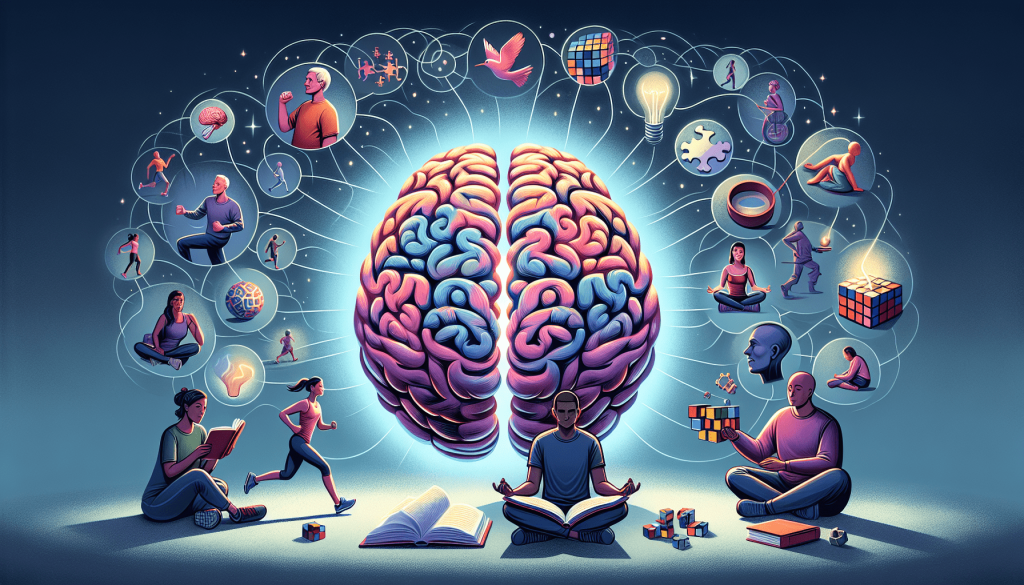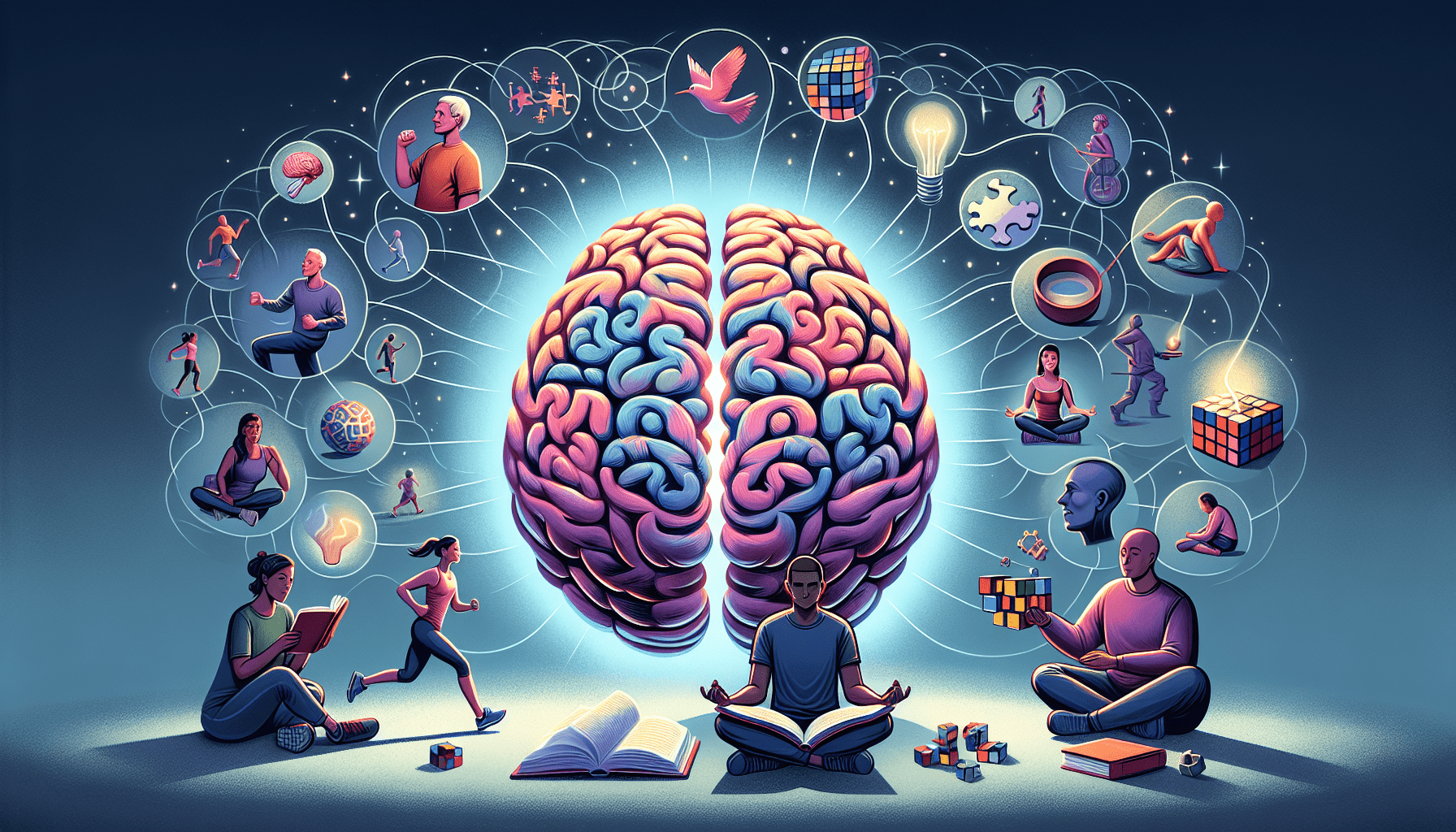What Activities Are Good For The Brain?
Did you know that the activities you choose to engage in play a significant role in the health and vitality of your brain? From solving puzzles to learning a new instrument, there are countless options to keep your mind sharp and functioning at its best. In this article, we will explore a variety of activities that have been scientifically proven to be beneficial for your brain. Get ready to discover new ways to challenge yourself and nurture the powerhouse that is your brain.
Physical Exercise
Physical exercise is not only beneficial for your physical health but also for your brain health. Engaging in regular aerobic exercises has been proven to have a positive impact on cognitive function. Activities such as running, swimming, cycling, or dancing increase blood flow to the brain, delivering essential oxygen and nutrients that promote brain health. Aim for at least 150 minutes of moderate-intensity aerobic exercise per week to keep your brain sharp and enhance your overall well-being.
Strength training is another excellent way to boost your brain health. By lifting weights or engaging in resistance exercises, you not only build muscle strength but also stimulate the release of growth factors that promote the growth and connection of brain cells. Incorporate strength training exercises into your fitness routine at least two days a week to improve cognitive function and memory.
Yoga, with its combination of physical postures, controlled breathing, and meditation, is not only a great way to improve flexibility and reduce stress but also an effective practice for enhancing brain health. The mindful movements and focused breathing in yoga help calm the mind, reduce anxiety, and improve concentration. Consider taking up yoga as part of your weekly routine to promote overall brain health.
If you enjoy expressing yourself through movement and music, dancing is an excellent brain-boosting activity. Not only does it improve coordination and balance, but dancing also engages multiple areas of the brain simultaneously. Whether you choose ballroom dancing, salsa, or hip-hop, moving to the rhythm of music enhances cognitive abilities such as memory, attention, and processing speed. So put on your dancing shoes and get grooving to boost your brain power.
Mental Stimulation
To keep your brain sharp and engaged, it’s essential to provide it with regular mental stimulation. Puzzles and brain games, such as crosswords, sudoku, and chess, are not only enjoyable but also help improve cognitive abilities. These activities challenge your brain, enhance problem-solving skills, and stimulate critical thinking. Set aside some time each day to engage in brain games to keep your mind active and alert.
Reading is a fantastic way to stimulate your brain and broaden your knowledge. Whether you prefer fiction, non-fiction, or self-help books, reading exposes you to new ideas, perspectives, and vocabulary. Reading regularly enhances memory, improves focus and concentration, and boosts overall brain function. Make reading a part of your daily routine, even if it’s just for a few minutes, to reap the numerous cognitive benefits it offers.
Learning a new skill is not only a great way to expand your horizons but also an effective method for keeping your brain active and engaged. Whether it’s playing an instrument, painting, cooking, or learning a new language, acquiring new skills challenges your brain and promotes neuroplasticity. The process of learning and mastering something new enhances memory, improves problem-solving abilities, and stimulates creativity. So pick up that guitar or enroll in a language class and enjoy the cognitive benefits of acquiring new skills.
If you’ve ever dreamed of playing a musical instrument, now is the perfect time to start. Learning to play an instrument not only brings joy and pleasure but also has numerous benefits for your brain. Playing an instrument engages multiple areas of the brain simultaneously, improving memory, attention, and coordination. It also enhances executive functions such as planning, decision-making, and problem-solving. So whether it’s a guitar, piano, or flute, embrace the art of playing an instrument to boost your cognitive abilities.

Social Interaction
Human beings are social creatures, and maintaining social connections is not only vital for our emotional well-being but also for our brain health. Joining clubs or organizations that align with your interests or hobbies is a great way to meet like-minded individuals and foster social interaction. Whether it’s a book club, a sports team, or a gardening society, being part of a social group provides opportunities for intellectual stimulation, sharing ideas, and forming meaningful relationships. So find a club or organization that piques your interest and enjoy the benefits of social interaction for your brain.
Volunteering is a rewarding way to give back to your community while also benefiting your brain health. Engaging in volunteer work provides a sense of purpose and fulfillment, which positively impacts mental well-being. Additionally, volunteering often involves interacting with others and engaging in new tasks, which stimulates cognitive function and can help improve memory and attention. Find a cause or organization that resonates with you and contribute your time and skills to experience the cognitive benefits of giving back.
Attending social events, whether it’s a party, a gathering, or a community event, offers ample opportunities for social interaction and stimulation. Engaging in conversations, sharing ideas, and connecting with others enhances cognitive function and promotes brain health. So make it a point to attend social events, meet new people, and strengthen your social connections for the benefit of your brain.
Participating in team sports not only boosts physical fitness but also provides an excellent opportunity for social interaction. Joining a local sports team allows you to engage in regular physical exercise while also fostering teamwork, communication, and social connections. The combination of physical activity and social engagement enhances brain health and overall well-being. So grab a basketball, soccer ball, or tennis racket and enjoy the cognitive benefits of team sports.
Mindfulness and Meditation
In our fast-paced world, taking the time to cultivate mindfulness and engage in meditation is more important than ever for our brain health. Practicing mindfulness involves being fully present and aware of the present moment, without judgment. This practice helps calm the mind, reduce stress, and improve focus and concentration. Allocate a few minutes each day to practice mindfulness, whether it’s through guided meditation, breathing exercises, or simply tuning in to your senses. The consistent practice of mindfulness can have a profound impact on your brain health and overall well-being.
Meditation is another powerful tool for enhancing brain function and reducing stress. By intentionally redirecting your focus to a specific object, sound, or mantra, meditation helps quiet the mind and promotes a state of relaxation. Regular meditation practice has been shown to improve attention, memory, and emotional resilience. Find a quiet space, sit comfortably, and allow yourself to experience the mental and emotional benefits of meditation.
Deep breathing exercises are simple yet highly effective techniques for calming the mind and reducing stress. By focusing on your breath and taking slow, deep breaths, you activate the body’s relaxation response, leading to a state of calmness and tranquility. Deep breathing exercises can be done anywhere, anytime, making them accessible tools for managing stress and promoting brain health. Practice deep breathing exercises whenever you feel stressed or overwhelmed to experience their relaxing and brain-boosting effects.

Sleep
Sleep is often underestimated but plays a crucial role in maintaining optimal brain health. Getting enough sleep is essential for cognitive function, memory consolidation, and overall well-being. During sleep, the brain processes and stores information, helping to improve learning and memory. Aim for 7-9 hours of quality sleep each night to give your brain the rest it needs to function at its best.
In addition to getting enough sleep, maintaining a consistent sleep schedule is equally important. Going to bed and waking up at the same time every day helps regulate your body’s internal clock, known as the circadian rhythm. The consistency of your sleep schedule ensures that your brain and body are well-rested and functioning optimally. Establish a regular sleep routine by creating a relaxing pre-bedtime routine and sticking to it for better sleep quality and brain health.
Nutrition
Proper nutrition is vital for overall health, and it also directly impacts brain function and cognitive abilities. Eating a balanced diet that includes a variety of fruits, vegetables, whole grains, lean proteins, and healthy fats provides your brain with the necessary nutrients for optimal functioning. Aim to incorporate colorful fruits and vegetables, such as berries, leafy greens, and sweet potatoes, into your meals to benefit from their rich antioxidant content, which helps protect brain cells from damage.
Consuming foods rich in omega-3 fatty acids, such as fatty fish (salmon, trout, mackerel), walnuts, flaxseeds, and chia seeds, is exceptionally beneficial for brain health. Omega-3 fatty acids are essential for building and maintaining brain cell membranes, supporting brain cell communication, and reducing inflammation. Add these omega-3-rich foods to your diet to nourish your brain and support cognitive function.
Drinking green tea can be a refreshing and brain-boosting habit to adopt. Green tea contains polyphenols and antioxidants that have been shown to improve brain function, enhance memory, and protect against age-related cognitive decline. Substituting sugary beverages with green tea can provide you with hydration and a cognitive boost simultaneously. So brew yourself a cup of green tea and savor its numerous health benefits, including those for your brain.
Limiting sugar intake is crucial for maintaining optimal brain health. Consuming excessive amounts of sugar, especially in the form of sugary drinks and processed foods, can have detrimental effects on cognitive function and memory. High sugar intake has been linked to increased inflammation in the brain, impaired memory, and a higher risk of conditions such as dementia and Alzheimer’s disease. Choose naturally sweet foods such as fruits and opt for healthier alternatives to sugary snacks to protect your brain’s well-being.
Stress Reduction
Chronic stress can have severe negative effects on brain health and overall well-being. Practicing relaxation techniques regularly is an excellent way to reduce stress and promote brain health. Techniques such as deep breathing exercises, progressive muscle relaxation, and guided imagery help activate the body’s relaxation response, lowering stress hormones and promoting a sense of calmness. Set aside dedicated time each day to practice these relaxation techniques and allow your brain and body to unwind.

Engaging in hobbies that you enjoy is not only pleasurable but also highly effective for reducing stress and improving cognitive function. Whether it’s painting, gardening, playing a sport, or solving puzzles, hobbies provide an outlet for creativity, self-expression, and relaxation. Find activities that bring you joy and make time for them regularly to reduce stress and enhance your brain’s health.
Spending time in nature has been shown to have numerous benefits for mental well-being and brain health. Whether it’s going for a walk in the park, hiking in the mountains, or simply sitting by the beach, immersing yourself in nature helps reduce stress, improve mood, and increase cognitive function. Nature provides a serene and peaceful environment that allows your brain to relax and recharge. Make nature a part of your routine by incorporating outdoor activities or simply dedicating some time to enjoy the natural beauty around you.
Brain-Boosting Supplements
In addition to engaging in brain-healthy activities, certain supplements can provide an added boost to your cognitive function and overall brain health. Omega-3 fatty acid supplements, such as fish oil capsules, can be beneficial for individuals who may not consume enough omega-3-rich foods. These supplements support brain cell structure and function, reduce inflammation, and promote healthy brain aging. Consult with a healthcare professional before starting any new supplements to ensure they are suitable for you.
Vitamin B12 supplements are particularly important for individuals who follow a vegetarian or vegan diet, as vitamin B12 is mainly found in animal-based foods. Adequate levels of vitamin B12 are essential for maintaining healthy nerve cells and supporting brain function. If you’re concerned about your vitamin B12 levels, consult with a healthcare professional who can recommend the appropriate supplementation for your needs.
Ginkgo biloba, an herbal supplement derived from the ginkgo biloba tree, has been used for centuries in traditional medicine to improve cognitive function. This supplement is believed to enhance memory, concentration, and overall mental alertness. However, it’s essential to consult with a healthcare professional before starting any ginkgo biloba supplements, as they may interact with certain medications and may not be suitable for everyone.
Brain-Training Apps and Software
In our technology-driven world, there are numerous brain-training apps and software available that can help boost cognitive function and improve brain health. These apps offer a range of activities and exercises specifically designed to challenge your brain and enhance various cognitive skills. Some popular brain-training apps include Lumosity, Elevate, and Peak. Incorporating these apps into your daily routine can provide an additional avenue for mental stimulation and brain exercise.
Maintaining Good Habits
In addition to adopting brain-healthy activities, maintaining good habits is crucial for overall brain health and well-being. Managing stress is essential, as chronic stress can have detrimental effects on the brain. Find healthy ways to cope with stress, such as practicing relaxation techniques, seeking social support, or engaging in enjoyable activities. Prioritizing stress management allows your brain to function optimally and promotes overall well-being.
Avoiding excessive alcohol consumption is vital for brain health. Heavy drinking can lead to memory loss, cognitive impairment, and an increased risk of developing conditions such as dementia and Alzheimer’s disease. If you choose to drink alcohol, do so in moderation and be aware of the potential risks to your brain health.
Not smoking is one of the best things you can do for your brain health. Smoking damages blood vessels and reduces blood flow to the brain, increasing the risk of stroke and cognitive decline. Quitting smoking or never starting in the first place is a significant step towards preserving your brain’s health and optimizing cognitive function.
By adopting brain-healthy activities and maintaining good habits, you can optimize your brain health, enhance cognitive function, and promote overall well-being. Incorporate these strategies into your daily routine, and enjoy the long-term benefits of a happy, healthy brain. Remember, it’s never too late to start taking care of your brain, so start today and embark on a journey towards brain-boosting activities and habits.
Additional Resources

They’ve tried to keep this a secret but everybody who’s struggled with brain problems has the right to see this. Now the truth is coming out to light.
There’s never been a better time for such a method to rise.
Click to See the Best Way to Repair Your Brain Function
Once you read the full story you’ll be amazed… And I guarantee you’ll be sharing this incredible tale with your friends, family and loved ones…







